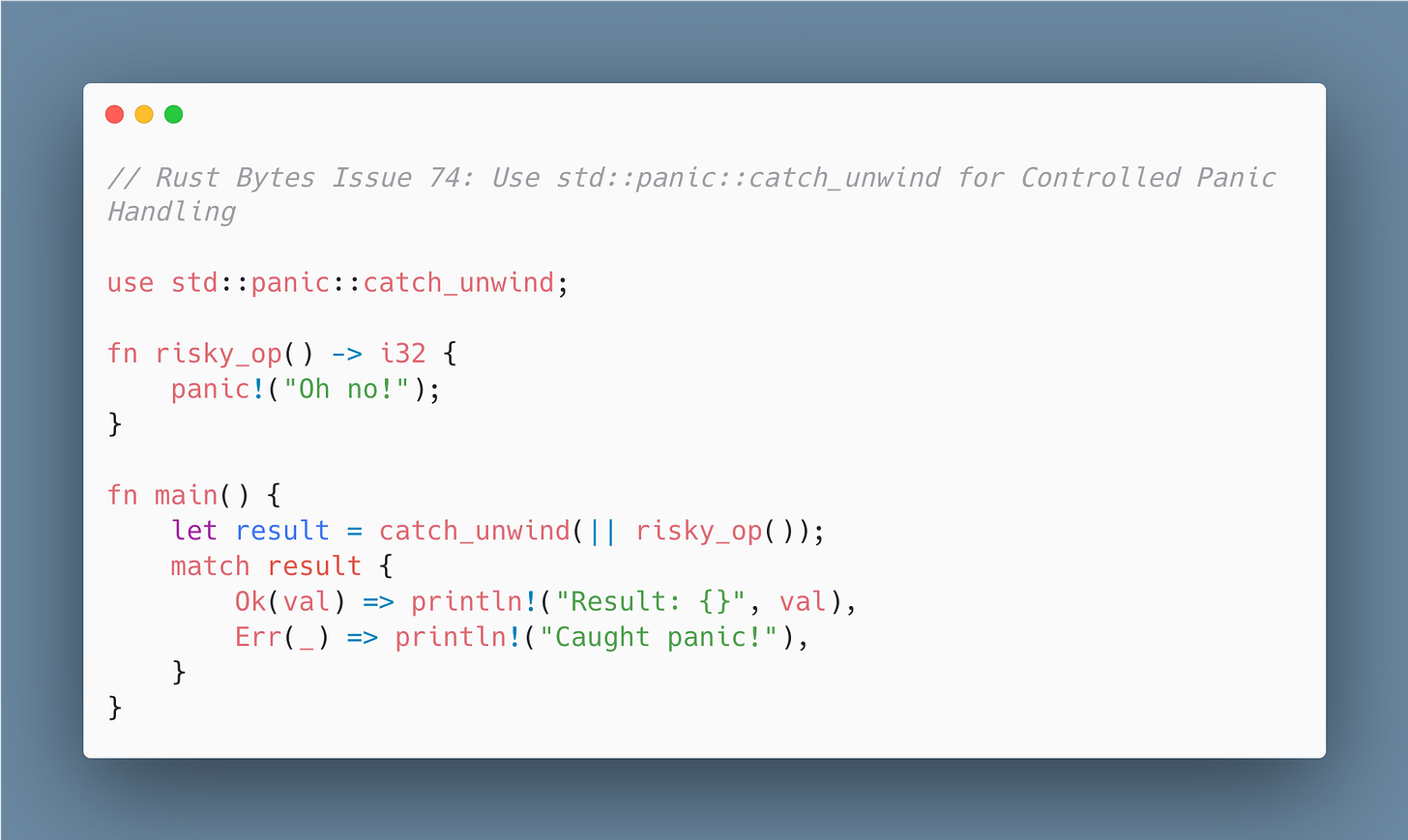Turso Silences the Critics
Today’s Issue: Meta’s Shift From Legacy C Code to Rust, Rust’s Memory Safety Complicating Security Analysis for Malware Detection, and Learning To Write Idiomatic Rust
Happy new month, Rustaceans.
Hope you had an amazing Independence Day last Friday (if you’re in the U.S), even with all this sizzling heat!
In this issue, we’ll discuss Turso’s alpha release of SQLite rewrite in Rust, present you a useful Rust tip, spotlight an amazing Rust project, and share ten (10) incredible links of the week.
Here’s issue 74 for you!
THE MAIN NEWS
Turso Silences the Critics
Six months ago, when Glauber Costa and the Turso gang vowed to rewrite SQLite in Rust under the codename Project Limbo, devs everywhere raised an eyebrow or two. “Another SQLite pipe dream?” we muttered.
Last week they announced an alpha release, shutting up the haters and proving they’re not just blowing hot air. But let’s be real here, betting against a company named after a Finnish mythological sea creature, with an engineer slinging code from prison? That’s a plot twist even M. Night Shyamalan couldn’t dream up.
They’ve also renamed it to Turso (edgy, right?), and it’s already flexing. Built from scratch in Rust, it swaps SQLite’s synchronous API for an async one, complete with io_uring support on Linux for snappy performance.
Here’s what makes this alpha release fun.
The big flex? It’s tackling SQLite’s notorious concurrent write issues, which choke under heavy loads like a newbie coder facing a merge conflict. Plus, it’s got native vector search for AI apps and better schema evolution - stuff SQLite’s closed community has been too stubborn to touch. Spice AI’s already seeing performance wins, and they’re hyped for more once concurrent writes fully land.
Why should you care? If you’re building real-time apps or AI-driven projects, Turso’s async vibes and open-source contribution model mean you’re not stuck begging SQLite’s gatekeepers for updates. It’s cloud-native, plays nice with browsers, and promises to handle data collection and logging without throwing tantrums.
They are also betting on modern testing (shoutout to Antithesis for catching sneaky bugs) to match SQLite’s bulletproof reputation. For devs juggling AI agents or edge computing, this could be a game-changer.
But it’s not all roses, indexes, multi-threading, and triggers are still WIP, so don’t ditch SQLite just yet. The team is also cocky about reliability, so they’re paying $1,000 for any data corruption bug you find. Tempting, right?
I bet Turso’s investors, from Guillermo Rauch, Tom Preston-Werner, and the Netlify duo of Matt Biilmann and Chris Bach are probably popping champagne as you’re reading this and planning how to spend their told-you-so bragging rights.
If Turso delivers (which indeed they are), it’ll be the SQLite glow-up we didn’t know we needed, until then, keep your bug-hunting hat on and maybe score that $1,000 for a summer beach getaway.
RUST TIP 🦀
In the previous issue, we challenged you to solve the word frequency counter problem.
Thanks to fistons, blackjacksepp, Serpent7776, Amaso, and Wesley Moore who shared their solution to the challenge. Great work!
Let’s move on to this week’s tip.
Use std::panic::catch_unwind for Controlled Panic Handling
std::panic::catch_unwind is a lesser-known tool to catch and handle panics, preventing program crashes in sensitive contexts like FFI or testing.
It captures panics and returns a Result, allowing graceful recovery.
You can play around with the code on Rust Playground.
Notes: This function might not catch all Rust panics. A Rust panic is not always implemented via unwinding, but can be implemented by aborting the process as well. This function only catches unwinding panics, not those that abort the process.
Check the docs on std::panic::catch_unwind for more information.
PROJECT SPOTLIGHT 💡
Quickwit
Quickwit is an open-source, cloud-native search engine for observability, offering a powerful alternative to solutions like Datadog, Elasticsearch, Loki, and Tempo.
Quickwit tackles high costs and complex scaling of search engines like Elasticsearch, optimizing for cloud-native environments.
It reduces costs by up to 10x with efficient IO and revamped index structures.
Here’s what makes Quickwit exciting:
Blazing Fast and Cost-Effective Search - Quickwit delivers lightning-fast search performance on cloud storage like Amazon S3, Azure Blob Storage, and Google Cloud Storage, making it ideal for large-scale observability.
Seamless Integration and Compatibility - You can easily migrate your log shippers (like Vector or Fluent Bit) thanks to support for a large subset of Elasticsearch/OpenSearch APIs, ensuring compatibility with your existing tools.
Flexible and Enterprise-Ready Features - It lets you index data with or without predefined schemas, giving you the flexibility to tackle diverse use cases with ease.
Scalable and Community-Driven - With Helm chart, you can deploy on Kubernetes for scalable, high-availability search (and indexing with Kafka).
With native support for Kafka, Kinesis, and Pulsar, plus sub-second searches on cloud storage like S3, Quickwit offers a playground for developers to build reliable, enterprise-ready observability solutions with minimal overhead.
Check out the project on GitHub at https://github.com/quickwit-oss/quickwit/.
AWESOME LINKS OF THE WEEK 🔗
New Rust program manager Tomas Sedovic shared June 2025 update: supporting Edition & Goals teams, improving communication, and driving initiatives like secure random generation and build-std. Folkert de Vries also wrote about the newly Stabilized naked functions.
The Zed team is back with their Zed Decoded series. In the latest episode, they discuss how they built the Agent Panel. [video]
Last week, Microsoft discussed why security researchers are having such a hard time with Rust-based malware in their writeup “Enhancing Rust malware analysis through pattern matching”.
Chetan Conikee has open-sourced mcp-probe, a Model Context Protocol (MCP) client library and debugging toolkit. It offers a production-ready SDK for building MCP integrations and a reliable foundation for an interactive debugger.
Pascal Hartig, Elaine W, and Buping W from Meta discussed their ambitious project to transition Meta’s core messaging library from decades-old C code to Rust, sharing insights on the mobile development shift. [audio]
Serhii Potapov wrote on “Alternative Blanket Implementations for a Single Rust Trait”, explaining how to bypass Rust's restriction on overlapping blanket trait implementations using marker structs, associated types, and a helper trait.
Remo Senekowitsch shared “A Newbie's First Contribution to (Rust for) Linux” detailing his contribution to the kernel as a Newbie.
Jonathan Kelley, creator of Dioxus, discussed its origins, core technology, path to a stable 1.0 release, and collaboration within the Rust UI ecosystem in an interview with Allen Wyma on The Rustacean Station Podcast. [audio]
Christian Visintin blogged about “A Rust allocator to trace memory allocations”, discussing how to identify memory allocations in Rust applications with minimal integration effort. The approach tracks memory by module, prevents infinite recursion, and is meant for debugging despite performance overhead.
Nicholas Nethercote introduced `-Zmacro-stats`, a new Rust Nightly compiler flag to quantify code generated by proc macros, revealing significant code size increases (e.g., tripling in a large project) and helping developers optimize compile times by identifying and replacing heavy macros.
CodeCrafters: Become a Better Rust Engineer
CodeCrafters created amazing Rust courses that push your skills beyond the basics.
You’ll have fun building real-world projects from scratch, including Git, Docker, Redis, Kafka, SQLite, Grep, BitTorrent, HTTP Server, an Interpreter, and DNS.
The courses are self-paced, so you can learn at your own speed.
If you’re itching to level up your Rust skills, these courses are perfect for you.
Here’s what makes CodeCrafters stand out:
You learn by building projects that challenge you beyond just implementing CRUD features.
Strengthen your fundamentals by working on awesome low-level projects.
You’ll get really good at reading and writing idiomatic Rust code.
Plus, you take part in monthly contests for a chance to win exciting prizes.
You can get your CodeCrafters fees fully reimbursed through your corporate Learning & Development (L&D) budget.
Check with your employer about using your L&D budget for CodeCrafters to save money and make this a no-brainer opportunity to level up your skills.
Join for free and get 40% off when you upgrade. [affiliate]
SUPPORT RUST BYTES
You’re Rust Bytes’ biggest fans, and we love to see it.
Here’s how you can help spread the word:
❤️ Recommend Rust Bytes to your friends.
🤳 Connect with us on our socials: X, BlueSky, Mastodon, Publication.
☕️ Support our editors by buying us coffee.
📨 Email us at rustaceanseditors@gmail.com for sponsorship, feedback or ideas.
We are currently conducting interviews with prominent figures in the Rust community and will share these interviews in upcoming issues.
That's all for now, Rustaceans.
John & Elley.





